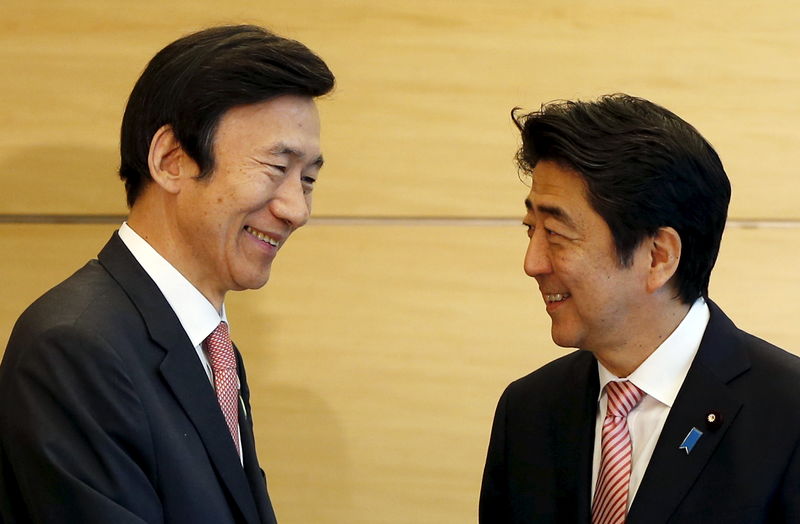By Ju-min Park and Kiyoshi Takenaka
SEOUL/TOKYO (Reuters) - East Asian neighbours South Korea and Japan marked the 50th anniversary of diplomatic ties on Monday with a push to mend relations strained for years by feuds over the legacy of Japan's wartime past.
The key U.S. allies are also working towards their first leaders' meeting in three years, hoping to move past tension that has complicated efforts to improve security cooperation in the face of an unpredictable North Korea and an assertive China.
Japanese Prime Minister Shinzo Abe attended a reception hosted by the South Korean embassy in Tokyo, while South Korean President Park Geun-hye was to attend a ceremony hosted by the Japanese embassy in Seoul.
Until Sunday, the two leaders had been expected only to send messages.
"Let us build a new era for our two countries together, while looking back at the 50 years of history of friendship and development and looking forward at the next 50 years," Abe said at the reception, where guests were serenaded with traditional Japanese and Korean music.
"For that, I would like to join forces with President Park Geun-hye and work together."
Park echoed the message, calling for the two countries to make a fresh start at a reception hosted by the Japanese embassy in Seoul and attended by heads of missions from around the world, including U.S. Ambassador Mark Lippert.
"As we seek to do so, what is important is to ensure that circumstances are put in place that allow us to free ourselves of the heavy burden of history, our single greatest impediment, in the spirit of reconciliation and harmony," Park added.
Park has not held bilateral talks with the Japanese leader since taking office in Feb. 2013, two months after Abe became prime minister.
However, feuds over wartime history, as well as a row over tiny islands claimed by both countries, still fester.
South Korea says Japan has not atoned properly for its World War Two conduct, including its role in forcing women, many of them Korean, into prostitution in military brothels.
Japan apologised to the women, euphemistically called "comfort women", in a landmark 1993 statement acknowledging the role of authorities in coercing them. It says the matter of compensation for them has been settled.
On Monday, descendants of Koreans conscripted to the Japanese imperial army or recruited for forced labour under Japanese colonial rule protested outside the Japanese embassy in Seoul, demanding compensation and recognition.

In Tokyo, Japanese right-wing activists in trucks with loud speakers circled the Korea Centre amid heavy policing, shouting slogans such as "Cut ties with South Korea."